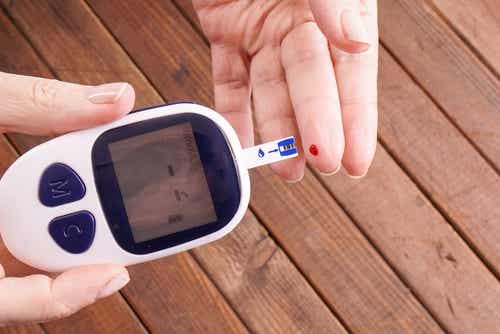What Exactly is the Robitussin Cough Syrup?


Reviewed and approved by the pharmacist Franciele Rohor de Souza
Robitussin is the trade name for a cough syrup containing guaifenesin. This active ingredient belongs to the expectorant group of drugs.
There are actually various types of Robitussin, depending on the combination of active ingredients it contains. These may contain guaifenesin, dextromethorphan, and pseudoephedrine, depending on the needs of the clinical picture.
Types of Robitussin
This drug comes in various presentations and its classification depends on its composition. It’ll always be a health professional who’ll decide which type is the most appropriate based on the symptoms and clinical picture. Let’s see the three forms and their uses.
Expectorant
This presentation of Robitussin contains guaifenesin as the only component. Its mechanism of action is to reduce viscosity and facilitating the elimination of mucus. In other words, secretions become more liquid, and so it’s easier to expel them from the body as it takes less effort.
Guaifenesin can relieve the chest congestion that appears as a consequence of a common cold. It’s also a useful mono drug in influenza and chronic bronchitis.
However, keep in mind that Robitussin only relieves the symptoms and doesn’t treat the cause. It’s neither an antibiotic nor an antiviral and mainly diminishes the symptoms.
This medication isn’t appropriate for those who are hypersensitive to any of the components of the formula. Those with a chronic persistent cough derived from tobacco, asthma, or emphysema should also skip it.
Furthermore, don’t take Robitussin if you’re diabetic or have gastritis, stomach ulcer, or liver disease. Also, those who’ve undergone or are undergoing treatment with tranquilizers should refrain from taking this cough syrup. The same applies to pregnant women or nursing mothers.

Read about the Symptoms, Causes, and Treatment of Chronic Cough
Robitussin DM
This presentation combines the expectorant action of guaifenesin with the antitussive action of dextromethorphan. Furthermore, dextromethorphan is an active substance belonging to the group of centrally acting antitussive drugs.
Dextromethorphan acts by soothing dry and irritative cough. This effect is due to a decrease in the kind of brain activity that causes coughing.
Therefore, a doctor will prescribe Robitussin DM to treat irritative cough and facilitate phlegm fluidification. It produces effects within an hour and a half of taking it and lasts up to six more hours, at which time the person must repeat the dose.
The following side effects may occur:
- Diarrhea
- Headache
- Dizziness
- Urticaria
- Abdominal pain
- Mild drowsiness
- Nausea and vomiting
Robitussin PE
This presentation combines guaifenesin and pseudoephedrine in its composition. It’s for the symptomatic treatment of cough with congestion, as well as nasal obstruction.
Pseudoephedrine is an active ingredient derived from ephedrine, used to treat rhinitis, nasal congestion, and asthma. Treatment with this cough syrup may have some side effects such as:
- High blood pressure
- Coronary heart disease when taken together with MAO inhibitor antidepressant drugs
- Agitation, nervousness, and tremors
Any person who’s sensitive to any of its components should skip Robitussin PE. Similarly, those undergoing treatment with MAO inhibitors or who underwent treatment with them during the previous two weeks must skip it as well.
Use this drug with caution, especially if you have a heart condition, hypertension, or diabetes. In addition, it may produce digestive side effects such as epigastric pain and diarrhea. In addition, don’t consume alcohol while you’re medicating this drug.

A cough requires more than medication
Only treat a cough if it keeps you from sleeping or leading a normal life. Furthermore, consult a doctor for any cough that lasts for more than a week.
As healthy measures, avoid anything that can irritate the respiratory tract, such as dust, smoke, and tobacco. Also, try to maintain adequate environmental humidity and avoid sudden temperature changes.
Another measure you might want to adopt is to drink about two quarts of water every day. This amount of fluid will help you thin the secretions and promote their expulsion.
Finally, a health professional may prescribe Robitussin if the cough requires pharmacological help to disappear as it has different formulations. Follow the doctor’s indications regarding the best one for you as well as proper dosage and length of treatment.
All cited sources were thoroughly reviewed by our team to ensure their quality, reliability, currency, and validity. The bibliography of this article was considered reliable and of academic or scientific accuracy.
-
Helfer, J., & Kim, O. M. (1990). Psychoactive abuse potential of Robitussin-DM. American Journal of Psychiatry. https://doi.org/10.1176/ajp.147.5.672b
-
Darboe, M. N., Keenan, G. R., & Richards, T. K. (1996). The abuse of dextromethorphan-based cough syrup: A pilot study of the community of Waynesboro, Pennsylvania. Adolescence.
-
Ward, K. E. (2005). Can Robitussin DM be used to treat cough during pregnancy? Medicine and Health, Rhode Island.
This text is provided for informational purposes only and does not replace consultation with a professional. If in doubt, consult your specialist.








